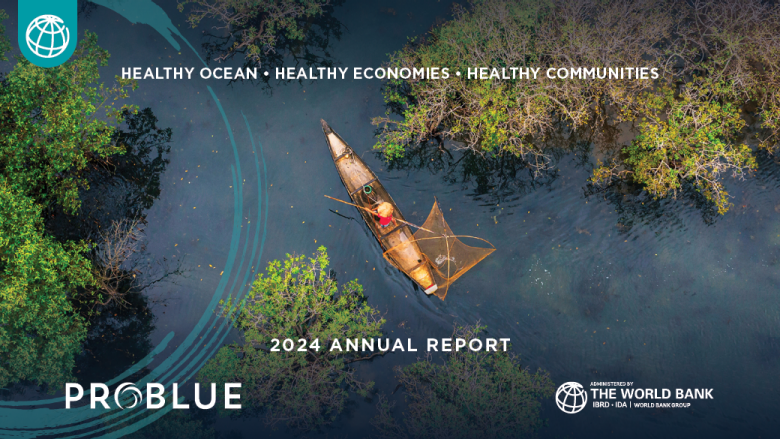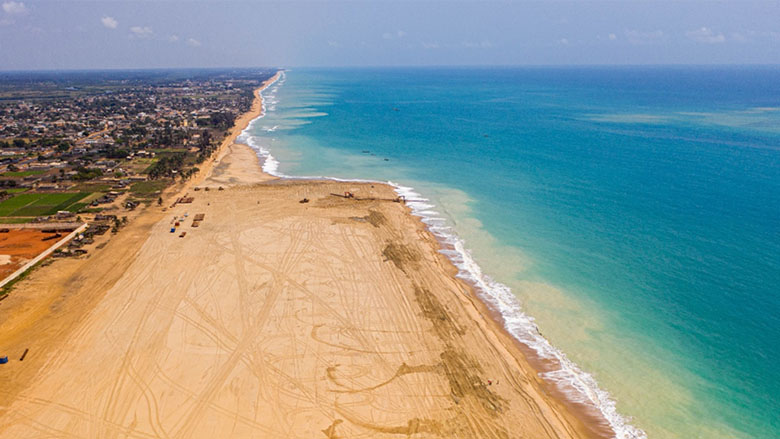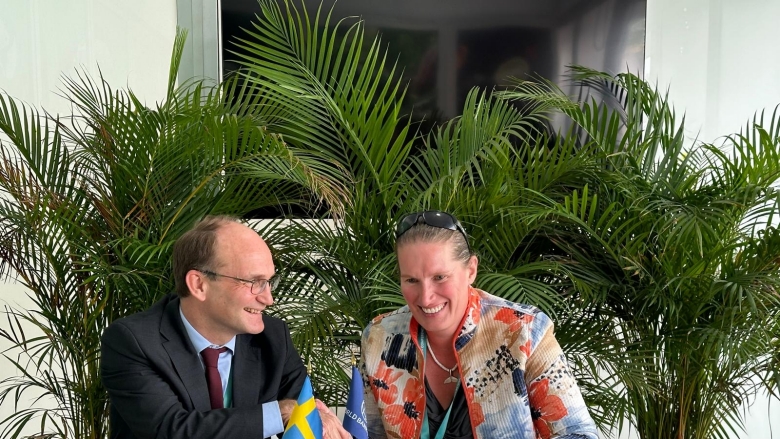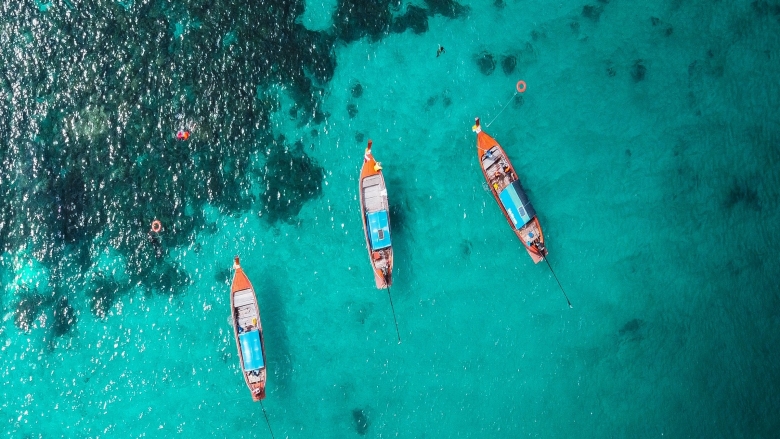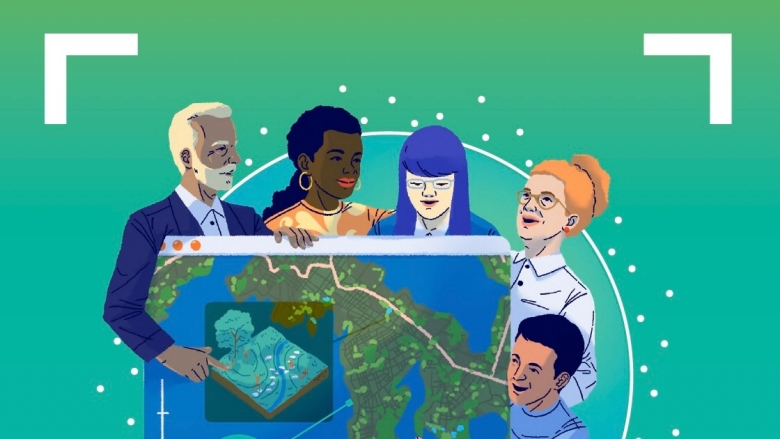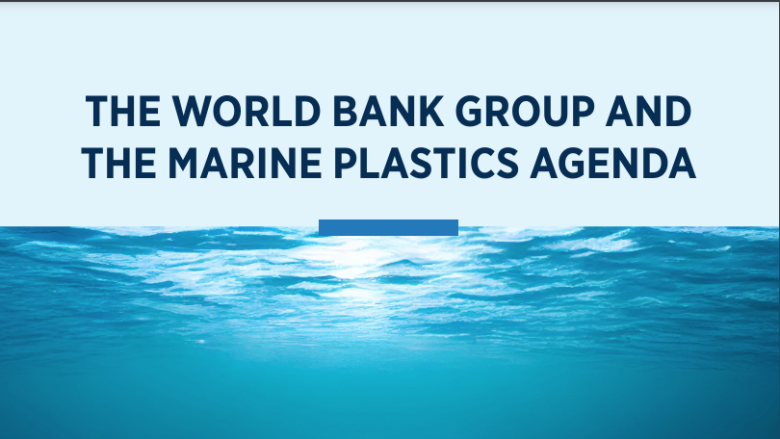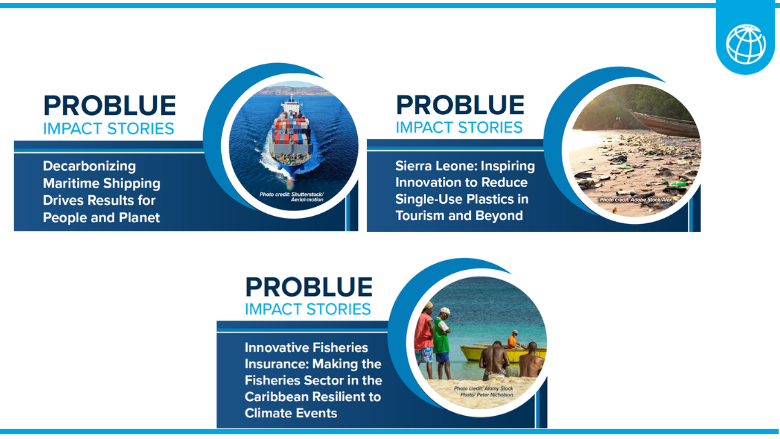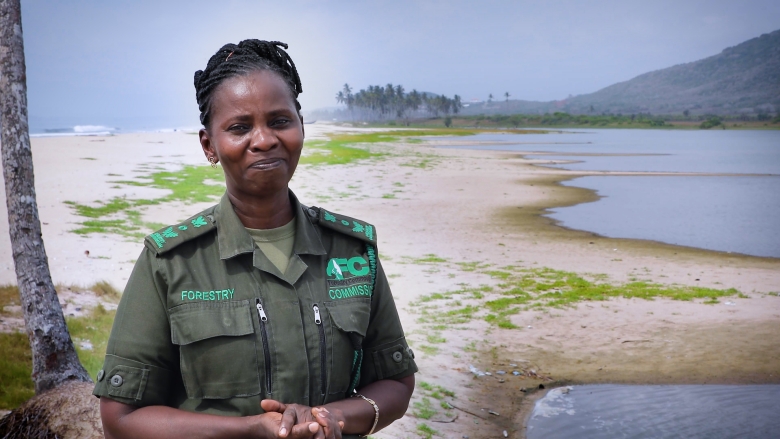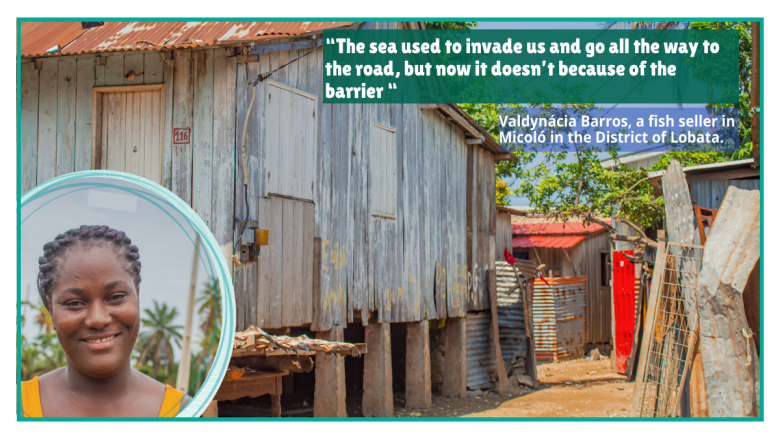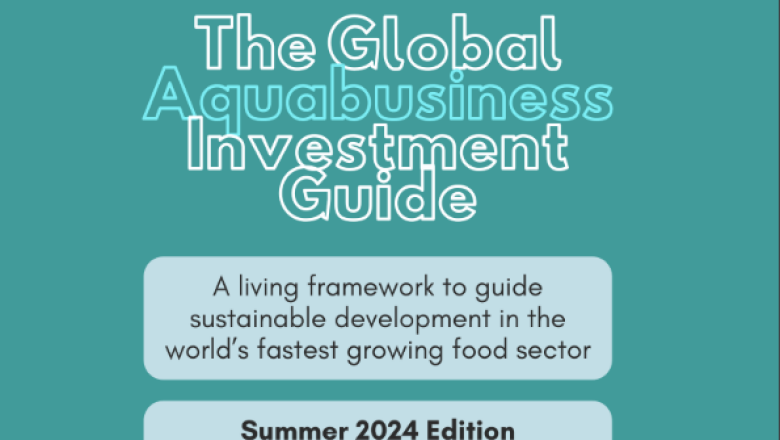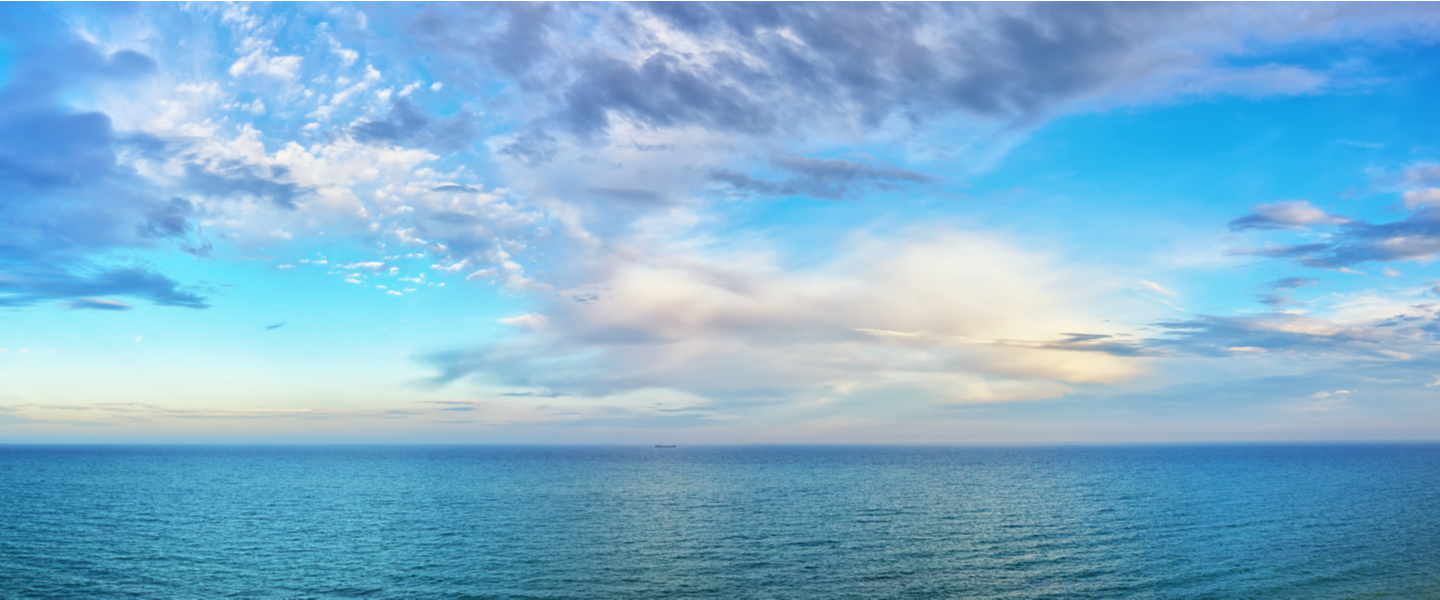
PROBLUE
Healthy Ocean ○ Healthy Economies ○ Healthy Communities
About the program
What is the Blue Economy?
MULTIMEDIA

The World Bank’s blue economy approach
FEATURED
The Aquaculture Digital Roadmap
Aquaculture provides more than half of the world’s seafood. In this Digital Roadmap, you can discover the latest trends and facts about the world’s fastest growing food production sector. Developed to strengthen knowledge across the World Bank, this roadmap has the potential to unlock aquaculture in landscape and sea escaping investment.
Morocco’s Blue Future: How Aquaculture Can Power Growth and Jobs
Morocco is expanding aquaculture to drive sustainable growth, aiming for 300,000 tons of production and 30,000 new jobs within a decade. Rising seafood demand and World Bank support are helping the country grow climate-resilient shrimp and seaweed, reach global markets, and draw in private investment.
Harnessing the Waters: Sustainable Aquaculture
Aquaculture could generate as many as 22 million new jobs by 2050, according to a new report that foresees a $1.5 trillion investment opportunity in the sector over the same period.
Accelerating Blue Finance: Instruments, Case Studies, and Pathways to Scale
Accelerating and scaling the effective use of blue finance requires a shift from fragmented pilot projects to coordinated, system-wide action.
The Ocean, Changing Lives and Powering Growth
Our new immersive story shows how countries and communities are using creative solutions to manage ocean resources in a more sustainable way.

World Bank at the UN Ocean Conference
The World Bank organized several side events at the 2025 UN Ocean Conference from 9-13 June in Nice, France.
PROBLUE 2024 Annual Report
This year's report showcases how PROBLUE and the World Bank are transforming commitments into concrete results for ocean health and sustainable development. In fiscal year 2024, PROBLUE approved 64 proposals amounting to $37.8 million, increasing its overall portfolio of technical activities to $182 million in support of 247 activities in over 100 economies.
Blue Food and Blue Jobs are Transforming Livelihoods
In Morocco, a project is improving the climate resilience of marine and coastal ecosystems with 182 beaches monitored; 14 fish stocks assessed to sustainably manage and restore declining stocks; and 1,113 hectares of coastal forests restored to protect the coastline.
Extended Support to the World Bank's PROBLUE
During the 16th summit for the Convention on Biological Diversity (COP16), Sweden strengthened its partnership with PROBLUE announcing additional support of SEK300 million (∼USD28.3 million).
World Bank’s PROBLUE Ocean Trust Fund Extended to 2030
The World Bank and twelve donor partners announced the extension of the PROBLUE program, a multi-donor trust fund dedicated to supporting a healthy and productive ocean, until the year 2030. The announcement was made at the second annual PROBLUE Global Engagement Forum.
The Nature-Based Solutions Opportunity Scan
Access to actionable information that outlines opportunities for nature-based solutions investments at early stages of project design is essential for enabling the scale up of these solutions. The Nature-Based Solutions Opportunity Scan is a geospatial analysis and participatory process offered by GFDRR as an on-demand service in cities and coastal areas worldwide.
The Ocean, Changing Lives and Powering Growth
Find out why protecting oceans is a gamechanger for people, marine life, the economy, and the planet.
The World Bank Group and the Marine Plastics Agenda
Read how the World Bank Group supports countries around the globe and across a broad array of sectors in their efforts to address plastic pollution from source to sea, at every stage of the lifecycle, from stopping leakages into the environment, to enabling a circular economy.
PROBLUE Impact Stories
Read examples of how PROBLUE is driving results and impact — helping countries and the global community achieve their Blue Economy goals.
Protecting Biodiversity in Ghana’s Wetlands
Wetlands are crucial for nature and the communities that depend on them. The World Bank's WACA Program, with support from PROBLUE, is supporting the Government of Ghana in the protection and restoration of the Muni Lagoon's natural habitat.
WACA Impact Stories
The World Bank with the support of PROBLUE and the Nordic Development Fund (NDF) launched these impact stories (in English, French and Portuguese). These stories showcase a selection of WACA flagship projects that have tackled key threats to West Africa’s coastal countries and had a powerful and positive impact on the region.
Sustainable Aquabusiness Investment Guide
The Word Bank's Aquabusiness Investment Advisory Platform, supported by PROBLUE, launched the "Sustainable Aquabusiness Investment Guide" in collaboration with Advance Africa Management Services.
The Blue Economy: An Ocean of Opportunity for Women
Story about how Unleashing the Blue Economy of the Caribbean Project (UBEC), a 15-year, $90 million initiative funded by the World Bank and the multi-donor ocean trust fund PROBLUE, is empowering female entrepreneurs.
Maldives Country Environmental Analysis
The CEA of the Maldives documents the main sustainable natural resource and environmental management challenges and provides recommendations for transitioning to a more sustainable, resilient, and inclusive Blue Economy.
WBG and the INC on Plastic Pollution Process
Check out our new webpage which has all the information about our contribution to the INC (Intergovernmental Negotiating Committee) process.
‘A Small Island Nation’: Pacific Island Fisheries Leaders Travel to Iceland
In late 2023, a group of 15 leading fisheries officials from the Pacific islands travelled to Iceland, supported by PROBLUE, as part of a World Bank-backed knowledge exchange – to learn from Iceland's experience of growing its fisheries sector, and to share knowledge from across the ocean.
Pioneering Registration of Plastic Reclaimers in South Africa
In South Africa, over 40,000 tons of plastic waste is dumped into the environment each year. Most of the plastic clogs drains, litters the environment, and ends up in the ocean.
Lebanon’s Costing Model for Solid Waste Management
Lebanon’s economic and financial crisis of 2019 has significantly accelerated the collapse of the waste management sector. Many waste treatment facilities ceased operations due to limited funding to run and maintain them.
The NBS Opportunity Scan: Observing the Earth to Design Natural Solutions
More than a third of the global population resides within 100 kilometers of the coast. These areas are becoming increasingly exposed to climate-related challenges. In addition, rapid urbanization places growing pressure on coastal ecosystems such as mangroves and coral reefs, and undermines the resilience of coastal communities.
Sierra Leone: Inspiring Innovation to Reduce Single-Use Plastics in Tourism
Like in many countries in West Africa, the consumption of single-use plastics in Sierra Leone has increased exponentially. Without adequate formal recycling facilities or waste collection systems, plastic waste litter streets, ravines, rivers, and streams increasing the risks of flooding and mosquitoborne diseases.
Decarbonizing Maritime Shipping Drives Results for People and Planet
Ports represent important gateways for development, fostering economic growth and allowing countries to participate in global trade and develop their Blue Economy. Yet, emissions from ships account for approximately three percent of global anthropogenic greenhouse gas (GHG) emissions.
Innovative Fisheries Insurance: Making the Sector in the Caribbean Resilient
Fisheries in the Caribbean employ over 300,000 people and contribute to food security and tourism, which many islands depend on. Yet, this vital sector is highly susceptible to climate hazards subjecting fishing communities to dire consequences in the aftermath of natural calamities.






